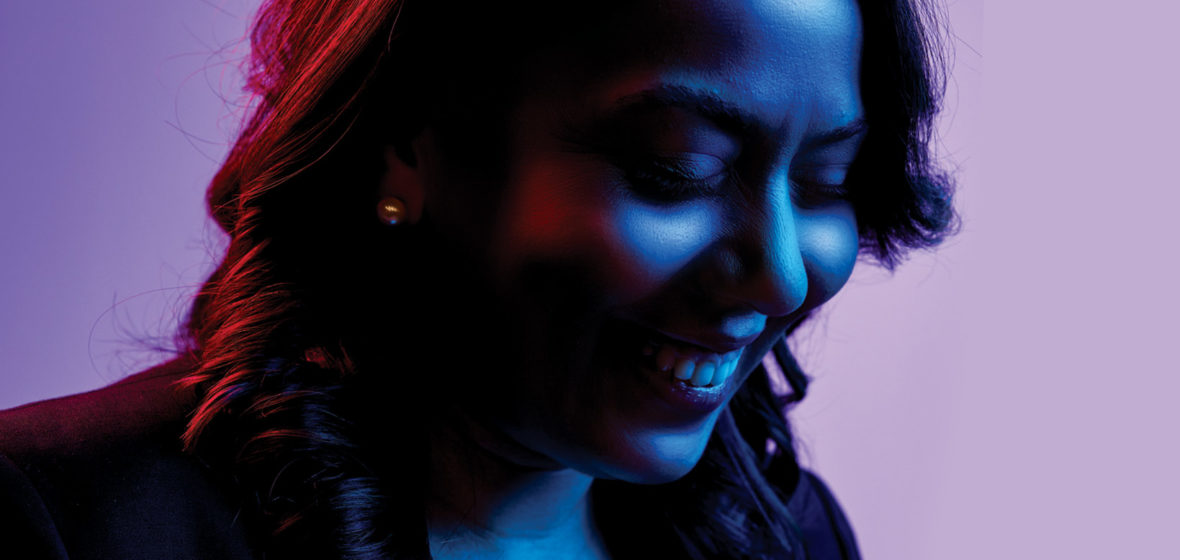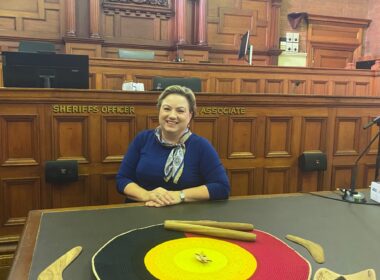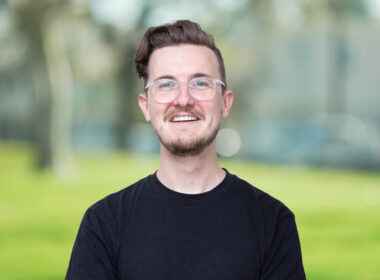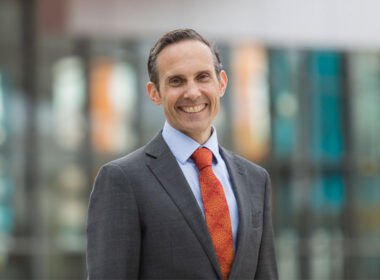You'd think fleeing war-torn Afghanistan as a child, becoming the “poster child for Islamophobia”, being the subject of relentless online vitriol and receiving death threats would make a person bitter, but as we discover Mariam Veiszadeh has no interest in delivering blame or anger, instead focussing on being part of the solution.
“I can explain things best with analogies,” Mariam Veiszadeh says candidly when asked about the source of her motivation at the start of her interview with the Law Society Journal. Veiszadeh has worn many impressive hats throughout her career: award-winning human rights champion, CEO, mother, commercial solicitor and diversity and inclusion specialist. Tackling racism and injustice is the thread that binds them together.
“Injustice is quite literally a roadblock. I don’t have a smooth highway to drive down and I keep stopping to remove roadblocks. But instead of just moving the roadblock for myself, I ask, ‘where is this roadblock coming from? How about I get rid of it entirely so that people coming down the highway after me won’t need to stop every five seconds?’ I just came up with that on the spot,” she laughs.
“I think this comes largely from my mother. When there is an inherent injustice somewhere, if I get a bee in my bonnet, watch out,” she says. “It is both a positive and negative trait, because it’s exhausting. I think it would be easier navigating the world if I didn’t care as much. But I can’t not care.”
Following a decade-long career as a lawyer, Veiszadeh is now the CEO of Media Diversity Australia and Founder of the Islamophobia Register. Though she briefly entertained the idea of becoming a hairdresser, professional tennis player and IT whiz growing up, Veiszadeh was always attracted to an “esteemed profession that had power, influence and a sense of justice”.
“A lot of us that do this work never set out to do it. When you go to your career adviser at school, the option is not anti-racism campaigner,” she says. “When I wanted to study law, I had people say to me, ‘are you sure?’ They doubted whether someone like me would be able to enter the profession, get a job, succeed and have a career. Entirely because of my background. At the time I also didn’t see a lot of people like me. I knew I was taking a risk, but I wanted to be part of that profession, whatever it took.”
“From a migrant background, my family risked getting killed to come to Australia. Not that I sit there and think about it all the time, but that is the reality. You tell yourself you have to succeed; failure isn’t an option.”
Understanding representation
Veiszadeh has not ruled out a return to practising. Off the back of winning Westpac’s prestigious Woman of Influence award in 2015, Veiszadeh became involved with the company’s Inclusion and Diversity department before eventually moving into a full-time role with the team. She says this unconsciously “propelled” her career outside the law. “I went from doing advocacy outside of 9-5 to doing what felt like advocacy within 9-5 parameters. I wanted to be part of the solution. That required me doing my bit,” she explains. “I never set out to reinvent myself, but I know many lawyers who have gone on to do other things. When I was working in diversity and inclusion, I was doing talks to law firms. I intimately understood what the challenges were from a legal perspective as well as from an advocacy, diversity and inclusion perspective.”
Veiszadeh was appointed the CEO of Media Diversity Australia (MDA) in November 2021, a national not-for-profit organisation led by journalists and media professionals. MDA “holds up a mirror” to organisations that “hold power and influence” in society. Her role requires having “deeply uncomfortable conversations” with the “big players” in the media landscape – advocating for an industry with full and equal participation for culturally diverse people at all levels. Veiszadeh declares she’s not a trained journalist (although her husband, former senior adviser to premier Gladys Berejiklian, is) but has stepped into the role as naturally as a bullfighter wielding a cape.
“Who controls the story holds the ultimate power. That takes you to media. I’ve been tackling racism in so many different ways, whether consciously or unconsciously, but I recognise the media is a megaphone for change and culture,” she says. “I’ve come to grips with how deep seeded some of the problems are that we are looking to unearth, raise awareness about and hopefully tackle. It’s not easy. It is certainly not a one person or a one organisation job. It is a whole of humanity task.”
At the heart of Veiszadeh’s social championing is the idea that “you can’t aspire to be someone you can’t see”. Long before starting with MDA, Veiszadeh advocated for greater representation of minority groups at all levels of government, businesses and institutions to alleviate disadvantage.
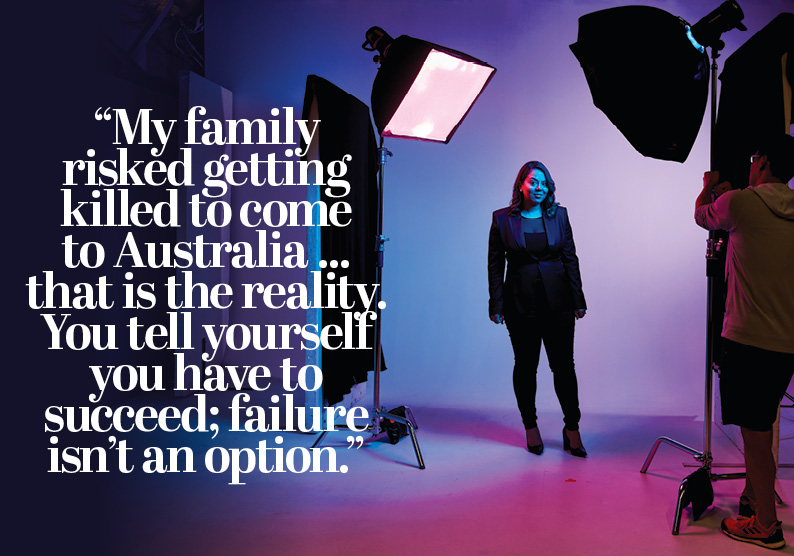
“Who controls the story holds the ultimate power. That takes you to media. I’ve been tackling racism in so many different ways, whether consciously or unconsciously, but I recognise the media is a megaphone for change and culture,” she says. “I’ve come to grips with how deep seeded some of the problems are that we are looking to unearth, raise awareness about and hopefully tackle. It’s not easy. It is certainly not a one person or a one organisation job. It is a whole of humanity task.”
At the heart of Veiszadeh’s social championing is the idea that “you can’t aspire to be someone you can’t see”. Long before starting with MDA, Veiszadeh advocated for greater representation of minority groups at all levels of government, businesses and institutions to alleviate disadvantage.
This is a key focus at MDA and the team is working hard to establish partnerships with media companies, having already launched a membership model with networks including AAP, ABC and Network 10. In 2020, the organisation released unique research called ‘Who gets to tell Australian stories?’, looking at the extent of inclusion and representation of culturally diverse presenters, commentators and reporters. Veiszadeh says a key takeaway from the report was that First Nations people need to be better represented on our screens. “It was effectively a sea of Anglo Celtic people telling stories. There is nothing wrong with that, if it was representative of the poplulation, but it means people don’t see themselves reflected,” she explains. “We are paving the way for making the changes required to ensure that the Australian media looks and sounds like Australians. At the moment it doesn’t.
“Nobody intentionally wakes up in the morning and decides they are going to have racist coverage of a particular media issue, or that they are going to perpetuate stereotypes in the editorial decisions they are making. But it is small things added to the fact you have a system that looks at the world in a particular way and has done so for years and years.”
The second tranche will be released in September 2022, providing a “report card” on how the Australia media is tracking. It will look at whose stories are not being told because their perspectives aren’t in the editorial decision-making process.
Part of what makes Veiszadeh compelling to listen to is her ability to take “unpopular opinions” and turn them into easily digestible thoughts. “I think about this every morning. My husband and I both have electric toothbrushes. Mine broke so we share the brush and just change the heads. The brush head colours we have are pink and blue. He said I could have the blue one, because he knows what I’m like,” she laughs, rolling her eyes. “But every morning, I unconsciously gravitate towards the pink one and I do gender equality for a day job. What it tells you is that in the morning haze, you are wired to associate pink with women. We might think we are progressives, but unconscious bias works in the quick decisions. Imagine if you are in a powerful position, involved in the editorial decision-making process, and you make those micro decisions impacted by bias. It happens no matter how aware you are.”
Through a legal lens
Having now worked in both the legal profession and the media landscape, Veiszadeh has a unique insight into how these “central institutions” co-relate. She says their relationship plays a vital role in determining how society understands the criminal justice system and who the public sees as perpetrators and victims. “Those two professions coming together are incredibly powerful in setting the narrative in interpreting circumstances in such a way that it makes a minority look more like the perpetrator,” she says.
“Minorities are used as stock images for negative stories, and they aren’t even the individuals who committed that crime. If the only time you’ve come across Muslims is in a negative context in a story about terrorism, what do you think you are going to associate them with? That is years and years of having to rewire people’s brains to not think like that.”
When Veiszadeh was studying law, she didn’t see many other people like her in prominent roles. This manifested into fear that she would be discriminated against on the basis of her religion and clothing choices. What would interviewers think when it came time to secure a job?
Veiszadeh commends the appointment of Magistrate Rana Daher to the Local Court earlier this year. Daher is the first Australian Muslim Magistrate in Hijab in NSW. The move has been hailed as a significant and inspiring milestone for improving diversity across the judicial benches of Australia. “If the legal profession, in all its ranks, is more reflective of Australian society, that can be nothing but a good thing. We are not used to seeing women of minority backgrounds in an esteemed profession. That plays a role in alleviating and challenging stereotypes,” she says proudly.
“The law shouldn’t be a profession that is a privilege that only people of wealthy backgrounds can afford to enter. That goes without saying across many industries. The circumstances of your birth shouldn’t dictate what opportunities you are afforded, and for too long it has. That is not a just world.”
Rethinking privilege
On a warm sunny day in May, Veiszadeh arrives for her photoshoot with the Law Society Journal. As she gets her makeup and hair touched up before another flurry of pictures are taken, Veiszadeh brings the whole affair into context; remarking how grateful she is to be standing in this position. “In some ways, this is a very privileged exercise. I feel like I’ve had such contrasting experiences throughout my life, and that gives me perspective,” she says.
“You see the lowest points in your life, and the highest points. If you don’t have those experiences, you can’t contrast and compare.” Veiszadeh speaks about her treacherous upbringing with an undercurrent of humility. Having gone through an experience unfathomable to most, she doesn’t stop to make the point that someone, somewhere has it worse off. There is a distinct line of thought at the crux of Veiszadeh’s advocacy; that she, like every other human being, didn’t exercise any choice in the circumstances of her birth. “Nobody gets to decide whether to be born male or female. No one gets to decide if they are born in Afghanistan or Australia. Because of decisions you didn’t make, ultimately you will be born into a level of privilege or not.”
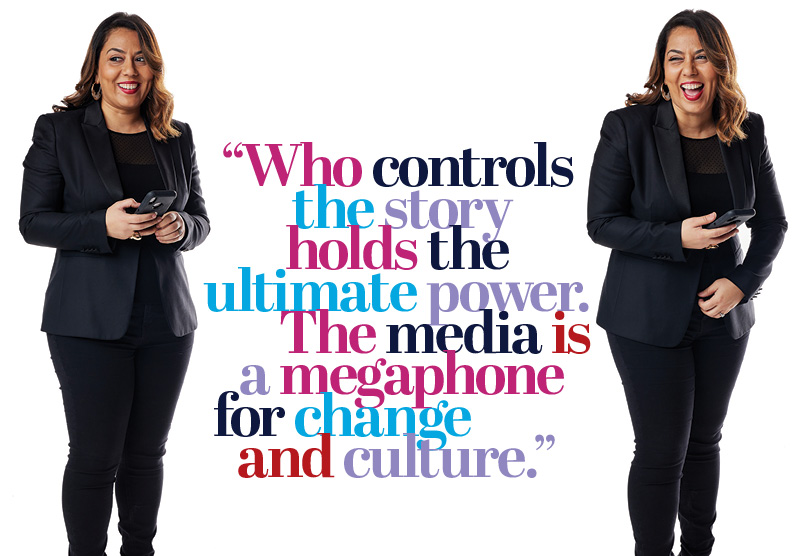
“I am here able to tell this story because I am already relatively privileged. Those that were able to escape Afghanistan, in my case during the Soviet War, you needed to have money to be able to pay a people smuggler to be able to leave the country. I was of a privileged household to be able to do that. It’s all relative.”
Veiszadeh and her family fled Kabul in 1988, when she was just four years old. They landed in Australia three years later via India, Czech Republic and Germany – each time making new friends and learning a new language at school. The family was granted asylum in 1991 under the Refugee and Special Humanitarian program. “I remember as a young girl being frustrated about why all my toys kept disappearing. When you are six or seven, that is your frame. Meanwhile, your parents are trying to figure out how to keep you alive,” she says.
“It is only now I have two kids myself and struggle to do the grocery run … Imagine having to relocate and avoid being captured by militia groups as you’re trying to cross the country. I can’t ever place that.”
To see her now as a regular commentator on some of the country’s most-watched panel shows, including the ABC’s Q+A program and The Drum, it is unimaginable to think she arrived in Australia as a shy seven-year-old who couldn’t speak English. Veiszadeh is still in touch with the teacher who pushed her into debating and public speaking. “I don’t think I was great at the beginning and I remember my teachers would help me write my speeches. We won our metropolitan championships and I still have the little trophy.”
To reiterate her point about privilege being “invisible to those who have it”, Veiszadeh retells a powerful story – shared by her sister-in-law during a phone conversation between the pair – about the plight of women in Afghanistan.
“It was about 3am on a cold Afghanistan morning. My family and I lived in a small village in the province of Herat. I was about five years old. We heard loud banging and then I heard screams. My sisters and I ran into the living room. We feared the worst, especially as my father was away on a work trip, and we felt even more vulnerable. We had heard about how local militia groups would barge into homes trying to kidnap young men or worse, kill them if they were not able to meet their demands. My mother told my brothers to flee. And flee they did. By the time the militia group had barged into our home, broken the door and all that was in their path, my brothers had left via the backyard.
“Several men stormed into our home – there were so many, I couldn’t count them – there were at least 20 of them. They were holding machine guns and had masks over their mouths – all we could see were their eyes. I had never seen my mother look so terrified as she did that night. What unfolded in the next 30 minutes or so will forever be etched in my memory. My mother, assuming they were there for my brothers, told them she had no sons. She pleaded with them not to hurt her and her young daughters. ‘We are not here to take your men,’ they declared.
“Turning their attention to my 20-year-old sister, they yelled that they had warned her many times – ‘How dare she continue to teach at the local school!’ While there were women who were teachers in other provinces, the small village we lived in Herat, my sister was one of a few female teachers. There in front of our eyes, they beat my sister so hard. Trying to drag her out the door, my mother pleaded with them to not take her. She offered herself up and told them to take her instead. ‘No,’ they screamed. They needed to ‘teach women a lesson that this behaviour was unacceptable!’ The screams, the yelling, the chaos. My sisters and I, aged between five to 14 years old, watched on in complete shock and horror. That was the last time we saw my sister. To this day, we do not know whether she is dead or alive.”
Veiszadeh declares that if what happened to her sister-in-law was a “choose your own adventure” game, there wouldn’t be many willing players. “If that story was one of two or three options, which one are you going to go for? Except this is real life and they didn’t get to choose,” she says.
“It goes back to the issue of ‘why are migrants who come to this country so troubled?’ It’s a privilege you’ve not had to experience your sister being kidnapped in front of your eyes. It is a privilege for you not to have experienced war and trauma.”
During her powerful TEDxSydney speech about this very topic in 2017, Veiszadeh hammered home that stereotyping, unconscious bias and privilege operate in such a way that creates an unequal playing field for diverse minority groups. She tells the Law Society Journal about how she sees this playing out in society. “Imagine you have a garden bed and you’ve planted seeds all along it,” she begins with another analogy. “One side could get plenty of sunlight and water. The other side could get half of that sunlight and none of that water.
“You can’t then say, ‘the side of the garden bed that has this luscious greenery has so much more merit’. It doesn’t. That side has been disadvantaged and therefore is never going to grow at the same rate.
“If we extrapolate that analogy and look at how disadvantage manifests in Australia with First Nations people, for example, having a higher rate of incarceration coupled with higher policing of these communities. If everybody was afforded the same equitable opportunities, there would be less disadvantage.”
‘The posterchild for trolling’
If anyone knows how to manage a “side hustle”, it’s Veiszadeh. She has dedicated the last 15 years of her life to intersectional gender equality, human rights advocacy and championing cultural diversity – largely alongside a demanding job as a corporate lawyer. In that time, if there was an opportunity to insert her voice into the dominant (and often negatively skewed) narrative about Muslims in Australia, she took it. While studying law at the University of Western Sydney, Veiszadeh gave talks at protests and rallies, defending her religion tirelessly against those who understood nothing about it.
Veiszadeh became a spokesperson for her wider community and has held numerous board seats on Muslim community organisations and diversity committees. She started doing interviews, writing opinion pieces for the likes of Fairfax newspapers and building a social media following.
“I had to navigate being corporate lawyer by day, and advocate by night. I was extra cautious of keeping those two separated. For a long time, I had two surnames, my maiden name and my married name, which I was strategically using to separate my lives,” she says. “My two worlds collided when my boss heard me on radio. I’d be working in the day and then at lunch time, I’d be doing a live TV interview outside the building.”
But with her public-facing profile came severe online trolling and physical threats. Veiszadeh says nobody consciously signs up to become “the unofficial sacrificial lamb” and “favourite poster child” of the anti-Islamic movement. But somehow, she found herself in that situation as a “visible Muslim” (at the time wearing a headscarf) and vocal anti-racism advocate.
On the day of her photoshoot in between the flash of the camera, Veiszadeh encourages the team to “look up the Wikipedia page for Internet Trolling”. She pauses as phones are pulled from pockets. “You’ll find my name,” she says, tinged with incredulity.
Over the course of Veiszadeh’s career she’s endured boxes of bacon delivered to her house, Neo-Nazi groups using her name as computer passwords, hate mail and endless cyber abuse. Her face has been photoshopped onto a picture of a woman being stoned to death, and subsequently shared online. “In a lot of the work that I’ve done, the trolling has been intersectional and gendered. It’s the triple whammy of faith, culture and gender. It adds layers and layers of disadvantage,” she says. “The perpetrators might have different profiles, but if its racist, sexist or misogynist; I’ve faced it. Until this day I keep facing it.”
In 2014, at the height of the abuse, Veiszadeh was working as a solicitor for Westpac. The company paid for security cameras to be installed at her family home and gave her a tracking device to carry and use in case of an emergency. Though Veiszadeh describes these experiences as “terrifying and extraordinary”, she’s sadly come to accept them as a necessary evil that comes with being an anti-racism advocate. “People look at me and say, ‘you defend other people, you’re so strong’. Actually, I’ve faced a lot of crap. You can’t just talk about diversity, inclusion and respect, and not preach it,” she says.
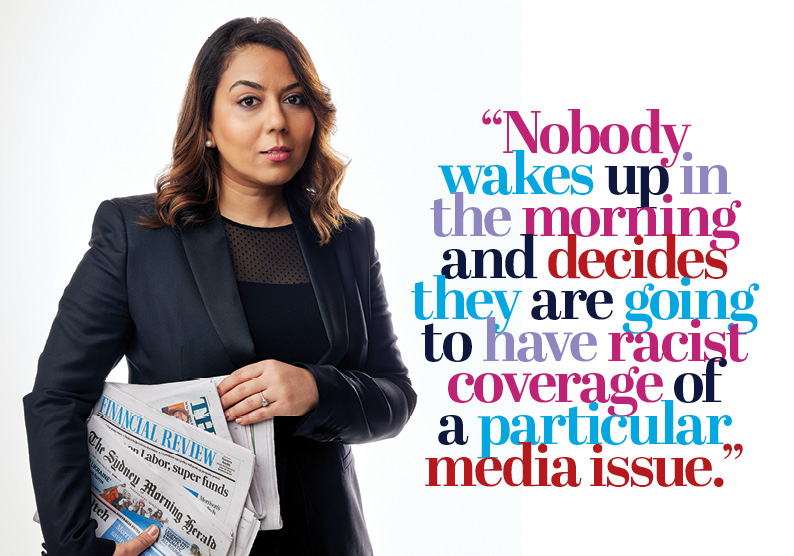
In addition to suffering extreme Islamophobia herself, Veiszadeh recognised an increase in similar anecdotal experiences among her circle of friends and family during this time. One of her friends was spat on while walking through Sydney’s Central Station. Another was verbally attacked waiting at the supermarket. Veiszadeh felt compelled to collate the stories and wanted authorities to know these weren’t just random attacks, but victims being deliberately targeted.
Then out of a place of “sheer desperation and practicality” while on parental leave with her daughter in 2014, the Islamophobia Register Australia was born. Veiszadeh calls the Register her “third child”, and the one who causes her the most grief. What began as a Facebook page calling on people to share their experiences, became a fully-fledged website that attracted interest from academics and Muslim community organisations to produce official reports from the findings. Veiszadeh hopes the Register will continue providing policymakers the data required to better understand and tackle Islamophobia in Australia. In March 2022, the Register published a report to coincide with the third anniversary of the Christchurch terror attacks, where 51 Muslims were murdered during a live-streamed killing spree. It found reports of Islamophobia endured by Australian Muslims quadruped after the attack.
The Christchurch tragedy will be forever imprinted on Veizadeh’s memory as the start of a series of events that led to her decision to no longer wear a headscarf and present as a visible Muslim. The mother-of-two speaks unembellished about this period of her life with the strength of a survivor who stills carries tender wounds from a traumatic accident. On the day of the attacks, Veiszadeh also found out her sister was diagnosed with cancer. Four months later, her father passed away. Less than a year later, COVID had taken over everyday life in Australia.
“I was gasping for air, and I had to think about what I could take off my plate to alleviate stress, and the headscarf was one of those things,” she says. “The pressure cooker situation was too much. Belonging to a minority, but also being trolled heavily online and having a public online profile, means there is no escaping. By day, you are visibly identifiable when you are out and about, add to that being a working mother. By night, you are being trolled and there is no escaping that either.
“Every anti-Islamic hate group in Australia knew about me and had used my photo. That becomes a difficult burden to carry with you day in and day out. Islamophobia and racism had every bit to do with me not wearing a headscarf today. Combined with personal reasons as well.”
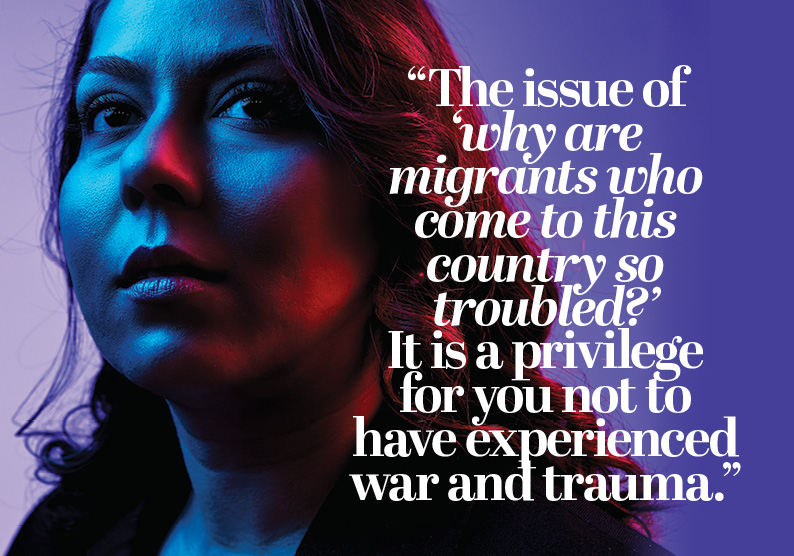
Veiszadeh admits she presents an impenetrable exterior to the world. But reveals the profound toll years of trolling has taken on her mental health. At one stage she was taking anti-depressants and spoke about it openly to challenge the taboo around minority groups hiding their internal struggles. “If you ask my friends to describe me, they will say I am a sensitive person. That is really interesting because I come across as someone who is deeply resilient. I am, but what choice do I have?”
“During the course of my career, I’ve had very serious threats to the point I’ve had two people charged. It’s not just a ‘toughen up, it’s a couple of mean Tweets’. You can’t throw that much at a person and expect them not to lose their s–t.
“If people are intimidated by you and are trying to bring you down, you’re doing something right.”
Inspiring the next generation
“My four-year-old is a massive sexist,” Veiszadeh says sarcastically. She tells the Law Society Journal about an exchange with her son during a recent family holiday. “My son had this car and the wheel had fallen off. I said, ‘give it to me and I’ll fix it’.”
“He replied, ‘No, Daddy can fix it. Girls can’t fix cars’. I felt like saying ‘do you know what mummy does?’,” she laughs.
Veiszadeh says conversations like this happen all the time at home. She has made a concerted effort with her parenting to nurture “little feminists” – to make sure her children don’t actively absorb stereotypes and bias.
“My four-year-old is not deliberately sexist. The point is that children absorb everything around them. If we are constantly giving girls and boys certain toys, what is the messaging you are giving them unconsciously?
“People think that it is harmless, but it’s not. It has implications for when they grow up.” “My daughter does like dolls, and my son likes cars. I’m not denying them that. It’s just about having a wholesome upbringing of not thinking they can only play with certain toys. It’s about giving them both options.
“To me it brings home that sexism, racism and misogyny are things that are picked up at a really young age.”
The night before the photoshoot, Veiszadeh was helping her eight-year-old daughter write a speech for a school project. “There were multiple topics and one of them was racism. What do you think she picked? We showed her little snippets of the White Australia policy and talked about slavery in the US … She was distraught that things like this could happen,” Veiszadeh relays. “She is a massive feminist … Sometimes I have to tell her to calm down. At age six, she was correcting her dad when he would use he or she pronouns for someone, instead telling him to say ‘this person’. It’s my fault obviously and I’m proud of that.”
Veiszadeh’s younger family members are following in her footsteps. Her nephew has been admitted as a solicitor recently and her niece is completing the second year of a law degree. She hopes they, and other young people of minority backgrounds, can feel inspired reading about her in the Journal. She hopes it serves as a poignant reminder that young people can achieve anything, regardless of background and circumstance.
“I wish I grew up seeing myself, or people like me, reflected in the top echelons of society. While I can’t quantify what kind of an impact it may have had, I know it would make a difference. I hope that I and people like me can be that for generations that follow including my own niece and nephew. I’m immensely proud of them.”

